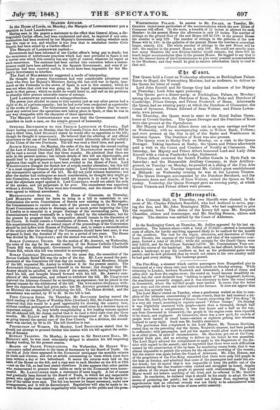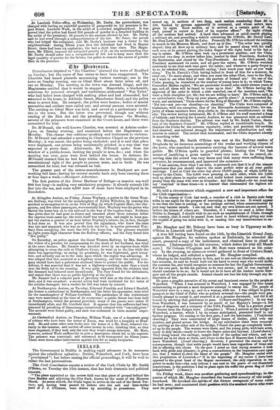be Itletropolis.
At a Common Hall, on Thursday, two Sheriffs were elected, in the room of Mr. Charles Pritchett Bousfield, who had declined to serve, pay- ing the fine, and Mr. John Bemington Mills, who had neglected to give the requisite bond. The choice of the Livery fell upon Mr. Benjamin Chandler, citizen and ironmonger, and Mr. Starling Benson, citizen and draper. The election was ratified by the Court of Aldermen.
In the Bankruptcy Court, on Thursday, Mr. Jallien appeared for his last ex- amination. The balance-sheet—with a total of 27,6351.—showed a lamentable state of affidrs, for hardly anything appeared likely to be realized for the benefit of the creditors. The cost for the repair, alteration, and decoration of Drury Lane Theatre, the expense of the Grand Opera, and that of the equestrian com- pany, formed a total of 30,5841.; while the receipts for the Grand Opera were only 9,8251., and for the Cirque National 5,678/. Mr. Commissioner Fane cen- sured the course of the bankrupt. Mr. Jullien said, he had offered, before he VMS made a bankrupt, to pay his creditors as fast as his professional gains would permit; and he now protested that he would not return to his own country until he had paid every shilling. The bankrupt passed.
The Fire-King, a steamer which carries passengers from Hangerford pier to Gravesend at a very cheap rate, met with an accident on Sunday evening. While returning to London, between Woolwich and Greenwich, a cloud of steam and ashes shot up from the engine-room; the crowd on board became dreadfully ex- cited, but the crew declared that "nothing to speak of" had happened; however, the machinery presently stopped, and it was necessary to have the vessel towed to Greenwich, where the terrified people were landed. It seems that the boiler gave way, and the steam and water entered the furnace. It does not appear that any one was actually hurt. The Lord Mayor stated on Tuesday, when a gentleman waited on him to com- plain of the infamous overcrowding of steam-vessels, that he had received a let- ter from Mr. Smith, the Surveyor of Steam-Vessels, respecting the" Fire-King." It is a very old vessel, according to register named " Pnnce George." On Sunday it was frightfully crammed with people—more than a thousand, though half would have been a complement; it was four hours and a half on the voy- age from Gravesend to Greenwich; the people in the engine-room were reported to be drunk, and negligent. At Greenwich, there was a new peril, for crowds of people were landed in small boats—sixteen or eighteen getting into wherries licensed to carry eight. Such was Mr. Smith's statement. The gentleman who complained to the Lord Mayor, Mr. Thomas Haw stated that on the preceding day the Syren, Woolwich steamer, had been packed to suffocatioa with passengers, and yet the master would allow more to squeeze in at other piers, in spite of remonstrances. Mr. Hawkins got out at the Com- mercial Dock pier, and on refusing to deliver up his ticket he was assaulted. The Lord Mayor advised the complainant to apply to the Magistrate of the dis- trict with regard to the assault; and he regretted that there were such difficulties caused by the construction of the by-laws for regulating steam-boats, that it was almost impossible to punish the owners for the excessive crowding of the vessels; but the matter was again before the Court of Aldermen. Mr. John Hotson' one of the proprietors of the Fire-King remarked that there were only 753 people in the boat on Sunday, and admitted that some of the passengers had made the sto- ker drunk; but he stated that it was impossible to keep the public out of the steamers during the fine weather—they rushed and struggled on board, despite the efforts of the steam-boat people to prevent such overcrowding. The Lord Mayor would not believe anything of the kind, and he referred to Mr. Smith's letter. In conclusion, he declared that it should be his study to adopt the best means of protecting the public; but he could not forbear from expressing his apprehension that an effectual remedy was not likely to be administered until imperatively called for by the voice of some awful calamity.
At Lambeth Police-office, on Wednesday, Mr. Darby, the pyrotechnist, was charged with having an unlawful quantity of gunpowder on his premises in Re- gent Street, Lambeth Walk, in the midst of a crowded neighbourhood. It was proved that the police had found 250 pounds of powder in a detached building in the midst of the premises: 50 pounds is the amount allowed by law. Mr. Darby said he had erred through a misapprehension of the law. Mr. Jones, the person who had lodged the complaint, said Mr. Darby's business was a terror to the neighbourhood: during fifteen years that the defendant had lived in Regent Street, there had been six explosions, the last a short time since. The Magis- trate, Mr. Elliott, imposed the mitigated penalty of Si, on the understanding that Mr. Darby should enter into a recognizance of 501. not to keep more than the legal quantity of powder for the future; the police to remove the excess of powder then on the premises.



























 Previous page
Previous page